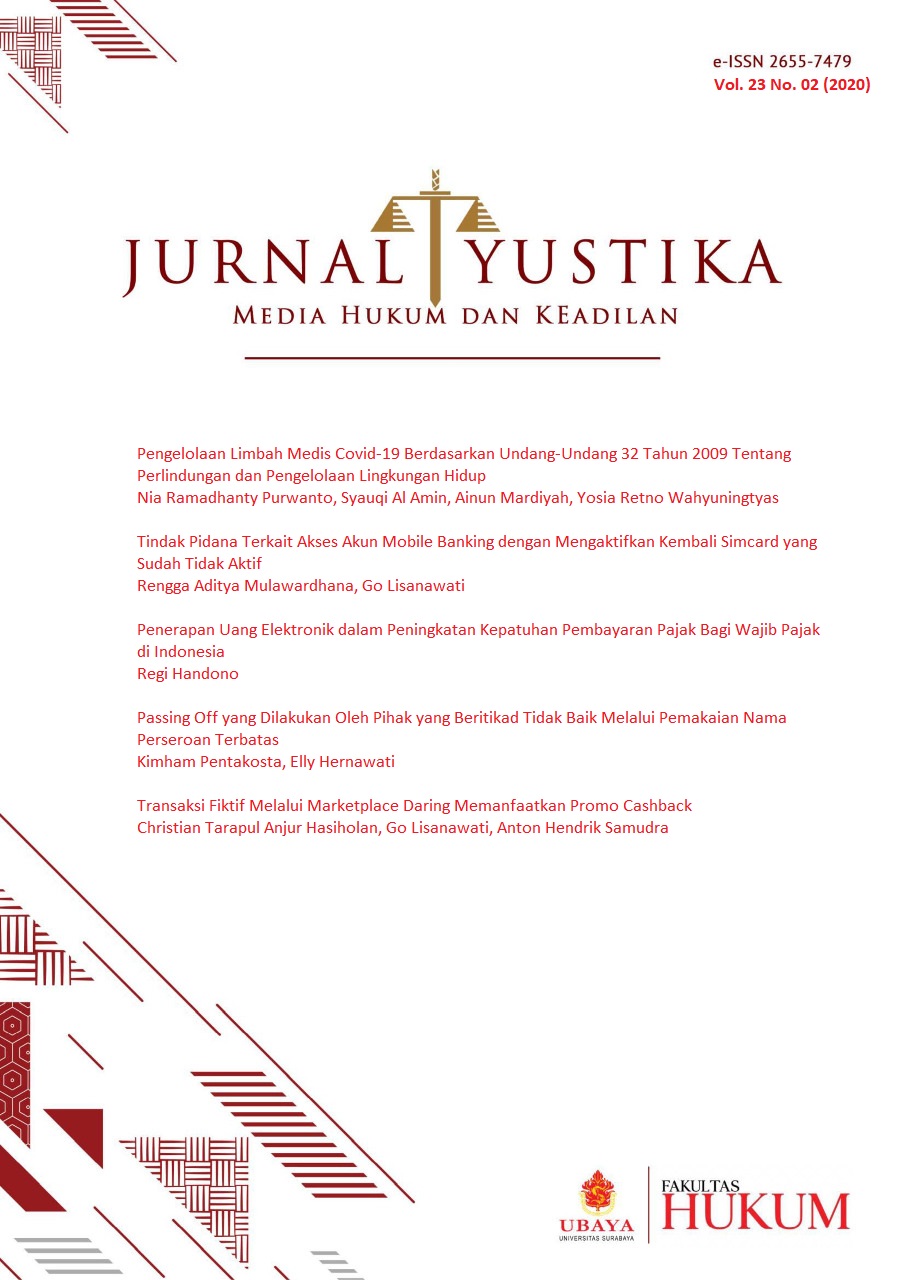Transaksi Fiktif Melalui Marketplace Daring Memanfaatkan Promo Cashback
 Abstract Views:
919 times
Abstract Views:
919 times
 PDF Downloads:
1069 times
PDF Downloads:
1069 times
Abstract
The present development of technology, mainly with the presence of internet has presented new ways and opportunities in business, namely by electronic commerce (e-commerce). Despite having positive impact, e-commerce also has the potential to cause a negative impact, that is by cyber crime. This research is intended to analyse the possibility of a new cyber crime mode which utilizes cashback promotion in e-marketplace (mainly known as marketplace). The mode used by the perpetrators is to make fictitious transaction in order for the system of marketplace to provide many cashback promos for each transaction made. The perpetrators are allowed to do this mode because they take advantage of the flaw in the system of the marketplace due to the availability of the cashback promo for all of the consumer. The emergence of the possibility of a new cyber crime mode shows the importance of this case to be assessed based on The Law of Republic Indonesia Number 19 of 2016 Concerning Amandment to The Law of Republic Indonesia Number 11 Number 11 of 2008 concerning Electronic Information and Transactions when a transaction is considered as manipulative.
Downloads
References
Buku:
Grabosky, Peter. (2007) Electronic Crime. Upper Saddle River: Pearson Education.
Marzuki, Peter Mahmud. (2005). Penelitian Hukum. Jakarta: Kencana
Soekanto, Soerjono dan Sri Mamudji. (2003). Penelitian Hukum Normatif: Suatu Tinjauan Singkat. Jakarta: Raja Grafindo.
Sutarman, H. (2007). Cyber Crime (Modus Operandi dan Penanggulangannya). Yogyakarta: Laksbang.
Artikel Jurnal:
Hiariej, Eddy O.S. (2014). Prinsip-Prinsip Hukum Pidana. Cahaya Atma Pustaka.
Mulyana, Yana dan Peti Savitri. (2015). Pembuatan Aplikasi Verifikasi Pembayaran dengan Metode Web Scraping Pada Pengembangan Aplikasi Penerimaan Mahasiswa Baru (Studi Kasus: Politeknik Manufaktur Negeri Bandung). Jurnal Manajemen Informatika Universitas Komputer Indonesia, Vol. 5, No 2. Diunduh dari: https://ojs.unikom.ac.id/index.php/jamika/article/view/647
Pamungkas, Danar Putra. (2019). Rancang Bangun Sistem Verifikasi Data Dokumen. Jurnal Ilmiah Inovasi Teknologi Informasi. Vol 3 no. 2 Universitas Nusantara PGRI Kediri. Diunduh dari: http://ejournal.unhasy.ac.id/index.php/inovate/article/view/739
Pasaribu, Ana Maria F. (2007). Kejahatan Siber Sebagai Dampak Negatif dari Perkembangan Teknologi dan Internet di Indonesia Berdasarkan Undang-Undang No.19 Tahun 2016 Perubahan Atas Undang-Undang No.11 Tahun 2008 Tentang Informasi dan Transaksi Elektronik dan Perspektif Hukum Pidana. Jurnal Hukum Universitas Sumatera Utara. Diunduh dari: https://jurnal.usu.ac.id/index.php/jmpk/article/download/19132/8068
Pradana, Mahir. (2015) Klasifikasi Jenis-Jenis Bisnis E-Commerce di Indonesia. Jurnal Neo-bis Universitas Telkom Bandung. Vol.9, No.2. Diunduh dari: https://journal.trunojoyo.ac.id/neo-bis/article/download/1271/1095
Prahassacitta, Vidya. (2019). Konsep Kejahatan Siber dalam Sistem Hukum Indonesia. Rubric of Faculty Members Binus University. Diunduh dari: https://business-law.binus.ac.id/2019/06/30/konsep-kejahatan-siber-dalam-sistem-hukum-indonesia/
Rahmanto, Tony Yuri. (2018). Penegakan Hukum terhadap tindak Pidana Penipuan Berbasis Transaksi Elektronik. Jurnal Penulisan Hukum De Jure, vol 19 no.1. Diunduh dari: https://ejournal.balitbangham.go.id/index.php/dejure/article/view/550/pdf_1
Artikel Internet:
Aturan Penggunaan Tokopedia.com. (2020) Diunduh dari: https://tokopedia.com/terms
Badan Siber dan Sandi Negara. (2020). Rekap Serangan Siber (Januari-April 2020). Diunduh dari: bssn.go.id/rekap-serangan-siber-januari-april-2020/
Grafik Pengguna E-commerce di Indonesia. (2020). Diunduh dari: https://databoks.katadata.co.id/datapublish/2021/02/11/10-e-commerce-dengan-pengunjung-terbesar-pada-kuartal-iv-2020
Shidarta. (2018). Data, Informasi, dan Dokumen Elektronik. Business-law Binus. Diunduh dari: https://business-law.binus.ac.id/2018/10/24/data-informasi-dan-dokumen-elektronik/
Peraturan Perundang-Undangan:
Undang-Undang Nomor 11 Tahun 2008 tentang Informasi dan Transaksi Elektronik
Undang-Undang Nomor 19 Tahun 2016 tentang Perubahan Atas Undang-Undang Nomor 11 Tahun 2008 tentang Informasi dan Transaksi Elektronik

This work is licensed under a Creative Commons Attribution-ShareAlike 4.0 International License.
All articles published in YUSTIKA are licensed under a Creative Commons Attribution-ShareAlike 4.0 International (CC BY-SA) license. This means anyone is free to copy, transform, or redistribute articles for any lawful purpose in any medium, provided they give appropriate attribution to the original author(s) and YUSTIKA, link to the license, indicate if changes were made, and redistribute any derivative work under the same license.
Copyright on articles is retained by the respective author(s), without restrictions. A non-exclusive license is granted to YUSTIKA to publish the article and identify itself as its original publisher, along with the commercial right to include the article in a hardcopy issue for sale to libraries and individuals.
Although the conditions of the CC BY-SA license don't apply to authors (as the copyright holder of your article, you have no restrictions on your rights), by submitting to YUSTIKA, authors recognize the rights of readers, and must grant any third party the right to use their article to the extent provided by the license.

 DOI:
DOI:




.jpg)




